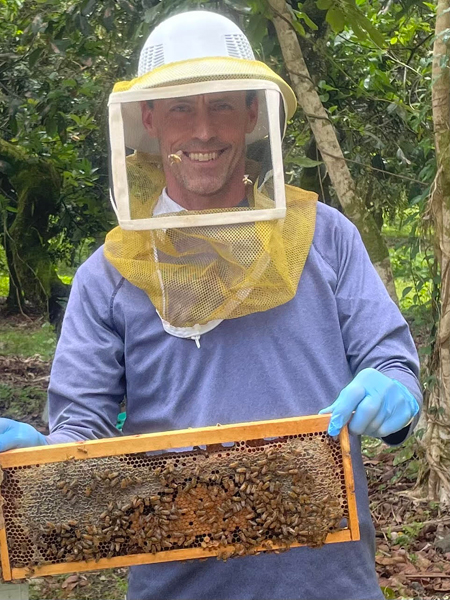USDA Scientists Honored as AAAS Fellows
Contact: Jan Suszkiw
Email: Jan.Suszkiw@usda.gov
WASHINGTON, April 18, 2024 – Two scientists with the U.S. Department of Agriculture’s Agricultural Research Service (ARS) have been named 2023 Fellows by the American Association for the Advancement of Science (AAAS).
Dr. Martin Williams, an ARS research ecologist, and Dr. Jay D. Evans, an ARS research entomologist, were named Fellows in a vote by the AAAS Council in recognition of their scientific contributions and leadership in the organization’s “Agriculture, Food and Renewable Resources” section.
AAAS has awarded the Fellows distinction since 1874. Past honorees include inventor Thomas Edison, anthropologist Margaret Meade and current USDA Under Secretary and Chief Scientist Chavonda Jacobs-Young among others. Along with other new AAAS Fellows, Dr. Williams and Dr. Evans will be recognized at a Sept. 21 Fellows forum at the 2023 AAAS Annual Meeting in Washington, DC.
“We’re immensely proud of these two very deserving scientists,” said ARS Administrator Dr. Simon Liu. “Their recognition by the American Association for the Advancement of Science is a testament to the scientific excellence they’ve demonstrated in tackling critical agricultural challenges, including helping farmers manage weeds in the face of climate change and keeping honey bees—our crops’ top pollinators—healthy and safe.”
 ARS research ecologist Martin Williams is a 2023 Fellow of the American Association for the Advancement of Science. (Photo by Martin Williams, ARS)
ARS research ecologist Martin Williams is a 2023 Fellow of the American Association for the Advancement of Science. (Photo by Martin Williams, ARS)
Dr. Williams works in the ARS Global Change and Photosynthesis Research Unit in Urbana, Illinois, and was recognized for his distinguished contributions in the fields of weed science and vegetable crop production, as well as his service to those communities. Dr. Williams’ laboratory is co-located at the University of Illinois Champaign-Urbana, where he holds an adjunct faculty appointment, mentors graduate students, and co-teaches a graduate-level course on crop production.
He has a well-documented, internationally renowned reputation for elucidating critical problems in crop production and delivering solutions to the vegetable seed and food processing industries in the U.S. and beyond. He led the team behind several significant contributions to the improvement of edamame, snap bean and sweet corn. His team pioneered novel methodology—using widely collected, but underused herbicide evaluation records—to help address the dual threats of weeds and climate change on grain crops. Dr. Williams earned a Ph.D. in agronomy at the University of Nebraska-Lincoln. He is also active in such professional organizations as the Weed Science Society of America and the International Sweet Corn Development Association.
 ARS entomologist Jay D. Evans is a 2023 Fellow of the American Association for the Advancement of Science. (Photo by Jay Evans, ARS)
ARS entomologist Jay D. Evans is a 2023 Fellow of the American Association for the Advancement of Science. (Photo by Jay Evans, ARS)
Dr. Evans is a lead scientist in ARS’s Bee Research Laboratory in Beltsville, Maryland, and was recognized for distinguished contributions to the fields of arthropod genomics, social insect biology, pollinator health and insect pathology—particularly studies of honey bee immunity and pathogens.
Dr. Evans joined the ARS Beltsville Bee Lab in 1999, first as a research entomologist, and later serving as its research leader for seven years. Throughout, his research has focused on improving bee health in the face of diseases such as chalkbrood and parasitic mites, as well as developing new pest management tools. He was also a leader in the Honey Bee Genome Project and helped develop new genetic tools for bee breeding and disease diagnostics, as well as investigate safe medicines for bees. He has mentored dozens of students, promoted greater awareness of bee health and served the USDA and bee industry in various capacities. He is the recipient of ARS Early Career (2003) and Senior Scientist (2023) awards, among others. Dr. Evans earned a bachelor's degree from Princeton University and a Ph.D. in genetics and behavior from the University of Utah.
The Agricultural Research Service is the U.S. Department of Agriculture's chief scientific in-house research agency. Daily, ARS focuses on solutions to agricultural problems affecting America. Each dollar invested in U.S. agricultural research results in $20 of economic impact.
